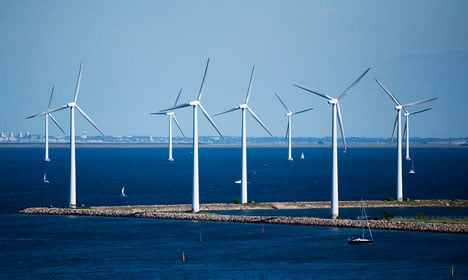An eleven percent PSO (Public Service Obligation) tariff that is tacked on to Danish residents’ electricity bills will be dropped, leaving the government with a massive financial loss that will have to be found elsewhere.
The PSO is used to finance green initiatives like wind and solar power, and its price is set quarterly by the state-owned Energinet.dk. The tariff currently stands at eleven percent.
The European Commission has contented that the tariff violates EU rules because foreign producers cannot receive the same PSO-funded support as Danish producers.
The government will thus have to find a new way to finance sustainable energy projects when the tariff is dropped by the end of the year.
The plans were announced by Tax Minister Karsten Lauritzen and Climate Minister Lars Christian Lilleholt on Tuesday.
“The PSO tariff is expensive and ineffective. We have long believed that the rising costs are unsustainable and now it is abundantly clear that we have to find an alternative. Therefore the government is ready for a showdown over the PSO levy,” Lauritzen told Berlingske.
Denmark has an overall goal to be fully independent of fossil fuels by 2050 and the PSO has been a valuable source of funding for hitting that goal. It is also why Danes pay the EU’s highest electricity prices.
According to news agency Ritzau, scrapping the PSO will result in a loss of 69.2 billion kroner between 2016 and 2020 and speculation immediately began on how the government plans to make up that loss.
Business daily Børsen reported that the government may try to make up at least some of the lost funds by raising residents’ basic income tax. But that plan will likely face resistance from two of the Venstre government’s key support parties, Liberal Alliance and the Danish People’s Party, which both expressed resistance to supporting any income tax increase.
Opposition parties, meanwhile, said they feared that getting rid of the PSO would effectively put a stop to Denmark’s green ambitions, which have already been scaled back by the current government.
Lilleholt tried to assuage critics by saying that the government will continue to invest in green solutions and would find a way to change the PSO structure so that it is not financed through residents’ energy bills but rather through the annual budget.
“I don’t have any problem with prioritizing the green transition through the budget in the same way that we prioritize hospital expansions, the purchase of fighter jets or investments in general infrastructure,” he told Ritzau.
Lilleholt would not say whether the government would attempt to make up for the missing PSO funds by raising taxes.
“We’ll take that up with parliament’s parties. But it is essential for the government that it doesn’t become more expensive to be a Dane or more expensive to run a business,” he said.


 Please whitelist us to continue reading.
Please whitelist us to continue reading.
Member comments